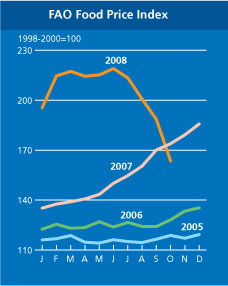- Frog porridge.
- Noni in excruciating depth.
- Caribbean seeks food security, turns to “cassava, sweet potato, bananas, yams and many others”.
- Uncommonly interesting article on commons.
- Nice summary of the amylase-gene-copy-number-and-starch-in-the-diet story.
- Dutch aurochs survived longer than thought.
- Yes, we have no oats.
Underutilized plants policies unpacked
Agrobiodiversity policy wonks will be delighted that the recently-morphed Global Facilitation Unit for Underutilized Species (GFU), in cooperation with the Genetic Resources Policy Initiative (GRPI), has just come out with the snappily titled “An overview of the international regulatory frameworks that influence the conservation and use of underutilized plant species.” You can download it from the Bioversity International publications pages, along with a separate publication, “The role of policy in the conservation and extended use of underutilized plant species: a cross-national policy analysis.” Other, country-specific GFU policy studies are also available.
Nibbles: Health, Fungi, Health, Pollan, Organic
- Nobellist praises biodiversity, ignores food.
- TED video on world-saving mushrooms.
- God: “Behold, I have given you every herb bearing seed, which is upon the face of all the earth, and every tree, in the which is the fruit of a tree yieleling seed; to you, it shall be for meat.“
- Pollan: “Vote with your fork, for a different kind of food. Go to the farmer’s market. Get out of the supermarket… Plant a garden… Declare your independence from the culture of fast food.”
- Rodale Institute: “Yield data just by itself makes the case for a focused and persistent move to organic farming systems.”
Food crisis almost over, people starving as usual
 Agriculture related press releases continue to start with a sentences like “The current crisis in world food prices…”. Take these three of yesterday’s posts on this blog: the above quote is from the article discussed in Great Expectations; we need induced mutations because: “The global nature of the food crisis is unprecedented”; and it is also a reason to go forth and grow halophytes: “There’s a real urgency to addressing the issue of rising food and fuel prices.”
Agriculture related press releases continue to start with a sentences like “The current crisis in world food prices…”. Take these three of yesterday’s posts on this blog: the above quote is from the article discussed in Great Expectations; we need induced mutations because: “The global nature of the food crisis is unprecedented”; and it is also a reason to go forth and grow halophytes: “There’s a real urgency to addressing the issue of rising food and fuel prices.”
Haven’t they noticed that the crisis is (almost) over? Supply is up and speculators are retracting. The first stories about complaining farmers are coming in. Perhaps I am missing the point of the long term trend of dearer oil (fertilizer) and climate change?
Either way, in a couple of months we’ll be back to business as usual. Cheap food, and,
every day, almost 16,000 children that die from hunger-related causes — one child every five seconds.
The farmers of the future
“America, we cannot turn back. Not with so much work to be done… Not with an economy to fix and cities to rebuild and farms to save.â€